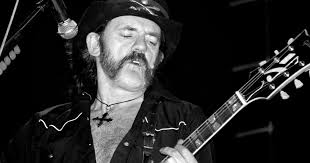
Lemmy was born Ian Fraser Kilmister, and was a titan of rock music whose raspy voice, thunderous bass playing, and rebellious persona made him an enduring icon.
Born on December 24, 1945, in Burslem, Stoke-on-Trent, England, Lemmy’s life was a testament to the power of individuality and the raw energy of rock ‘n’ roll. As the founder, lead singer, bassist, and primary songwriter of Motörhead, Lemmy left an indelible mark on music history. His career also included a significant stint with the space-rock band Hawkwind, showcasing his versatility and innovation as a musician.
Early Life and Influences
Ian Fraser Kilmister’s childhood was marked by modest beginnings. His father, a former Royal Air Force chaplain, abandoned the family when Lemmy was just three months old. Raised by his mother and grandmother, Lemmy grew up in Newcastle-under-Lyme and later in North Wales. As a teenager, he was drawn to the burgeoning rock ‘n’ roll scene, idolizing artists like Little Richard, Chuck Berry, and the Beatles. His rebellious streak and fascination with music became evident when he picked up the guitar and began experimenting with sound.
Lemmy’s nickname reportedly stemmed from his habit of asking people to “lemmy [lend me] a quid,” a reflection of his resourceful and audacious personality. By his late teens, he was deeply immersed in the music scene, playing in local bands and absorbing the cultural shifts of the 1960s.
Early Career and Hawkwind
Lemmy’s professional music career began in earnest in the 1960s, playing in various bands including the Rockin’ Vickers, a group that brought him on his first tours abroad. His musical style began to take shape as he moved through the psychedelic and blues rock scenes, eventually landing a roadie gig for Jimi Hendrix. This experience profoundly influenced him, solidifying his commitment to a life in music.
In 1971, Lemmy joined Hawkwind, a pioneering space-rock band. As the group’s bassist and occasional vocalist, Lemmy contributed to some of Hawkwind’s most iconic tracks, including the hit single “Silver Machine.” His driving basslines and gravelly vocals added a raw edge to the band’s ethereal sound. However, his tenure with Hawkwind was tumultuous, marred by clashes over creative direction and lifestyle differences. In 1975, Lemmy was fired from the band after an arrest for drug possession while on tour in Canada.
The Birth of Motörhead
Following his departure from Hawkwind, Lemmy wasted no time in forming a new band. Motörhead was born later in 1975, named after the slang term for an amphetamine user. Lemmy envisioned the group as a fusion of hard rock and punk, creating a sound that was loud, fast, and unapologetically aggressive. Joined by guitarist Larry Wallis and drummer Lucas Fox, Motörhead initially struggled to gain traction, but Lemmy’s determination drove the band forward.
.
.
Motörhead’s breakthrough came with the release of their self-titled debut album in 1977. Over the next few years, the band solidified its lineup with “Fast” Eddie Clarke on guitar and Phil “Philthy Animal” Taylor on drums. This classic trio produced some of Motörhead’s most iconic albums, including Overkill (1979), Bomber (1979), and Ace of Spades (1980). The title track of Ace of Spades became the band’s defining anthem, showcasing Lemmy’s gravelly vocals, distinctive bass playing, and lyrics steeped in gambling and rebellion.
Lemmy’s Musical Style
As a bassist, Lemmy developed a unique approach that set him apart from his contemporaries. Using a Rickenbacker bass guitar, he played with a distorted, guitar-like tone, often using chords and aggressive picking techniques. This unorthodox style blurred the lines between rhythm and lead, contributing to Motörhead’s wall-of-sound aesthetic. Lemmy’s songwriting was equally distinctive, blending themes of war, gambling, love, and mortality with a gritty sense of humor.
Lemmy’s voice was another hallmark of his music—a raw, gravelly growl that conveyed both menace and charisma. His vocal delivery was perfectly suited to Motörhead’s high-octane sound, cementing his status as one of rock’s most recognizable frontmen.
Cultural Impact and Legacy
Motörhead’s influence extended far beyond their commercial success. They were a bridge between the punk and metal scenes, earning a dedicated following among fans of both genres. Their relentless touring and uncompromising attitude made them a beloved fixture in the rock world. Lemmy, with his iconic mutton chops, cowboy boots, and trademark hat, became a symbol of rock ‘n’ roll rebellion.
.

.
Over the course of his career, Lemmy collaborated with a wide range of artists, including Ozzy Osbourne, Slash, and Dave Grohl. His contributions to rock music were recognized with numerous accolades, including a Grammy Award for Best Metal Performance in 2005 for the song “Whiplash,” a Metallica cover. Despite these honors, Lemmy remained humble, prioritizing his music and his fans above all else.
Personal Life and Philosophy
Lemmy’s lifestyle was as legendary as his music. Known for his hard-living persona, he was a heavy drinker, an unabashed fan of amphetamines, and a fixture at the Rainbow Bar and Grill in Los Angeles. Yet, he was also known for his sharp wit, intelligence, and generosity. Lemmy’s extensive collection of military memorabilia reflected his fascination with history, particularly World War II, though he was careful to distance himself from any political ideologies associated with the artifacts.
Despite his larger-than-life image, Lemmy was remarkably down-to-earth. He maintained close relationships with his bandmates and fans, often taking the time to chat and sign autographs. He once remarked, “I don’t see the point in doing anything else—I’d be a fool to stop making music.”
Later Years and Death
Motörhead continued to release albums and tour extensively throughout the 1990s and 2000s, with Lemmy remaining the band’s sole constant member. Their later albums, such as Inferno (2004) and Bad Magic (2015), showcased a band that had lost none of its edge.
In his later years, Lemmy’s health began to decline, exacerbated by decades of hard living. He was diagnosed with diabetes and later faced heart issues. Despite these challenges, Lemmy remained active, performing with Motörhead until the very end. His final concert took place on December 11, 2015, just weeks before his death.
On December 28, 2015, Lemmy died at the age of 70, just two days after being diagnosed with an aggressive form of cancer. Tributes poured in from across the music world, with fans and fellow musicians celebrating his life and legacy. Dave Grohl referred to Lemmy as “one of the greatest human beings I’ve ever met,” while Ozzy Osbourne declared, “He will be sadly missed. He was a warrior and a legend.”
Legacy
Lemmy’s influence on rock and metal is immeasurable. As the driving force behind Motörhead, he inspired generations of musicians to embrace authenticity, passion, and grit. His contributions to the genre helped shape the sound of heavy metal and its subgenres, earning him a place among the pantheon of rock legends.
Beyond his musical achievements, Lemmy’s enduring appeal lies in his unapologetic individuality. He lived life on his own terms, embodying the spirit of rock ‘n’ roll in its purest form. As he famously said, “Born to lose, live to win.” This ethos continues to resonate with fans around the world, ensuring that Lemmy’s legacy will endure for generations to come.
Check out Lemmy on Amazon by clicking here.
Check out Motorhead on Amazon by clicking here.
Check out Hawkwind on Amazon by clicking here.
Why not find out more about some other great Musicians who died in 2015 by clicking here.
.

